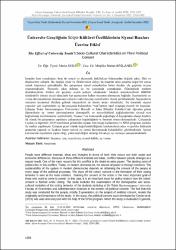Üniversite gençliğinin sosyo-kültürel özelliklerinin siyasal rızaları üzerine etkisi
Citation
Sesli, M. & Arslanel, M. N. (2022). Üniversite Gençliğinin Sosyo-Kültürel Özelliklerinin Siyasal Rızaları Üzerine Etkisi . Afyon Kocatepe Üniversitesi Sosyal Bilimler Dergisi , 24 (4) , 1359-1382 . DOI: 10.32709/akusosbil.1023700Abstract
İnsanlar hem yaradılışları hem de sosyal ve ekonomik farklılıkları bakımından değişik çıkar, fikir ve düşüncelere sahiptir. Bu değişik çıkar ve fikirlerinden dolayı da insanlar arası çatışma doğal bir sonuç olarak karşımıza çıkmaktadır. Bu çatışmanın temel sebeplerden birini iktidarı ele geçirme arzusu oluşturmaktadır. Siyasetin çıkış noktası da bu çatışmada yatmaktadır. Günümüzde modern demokrasilerde iktidarı ele geçirme seçim yoluyla olmaktadır. Modern demokrasilerde sistemin sürdürebilir olması siyasi süreçlerin her aşamasının halkın rızasının alınmasına bağlıdır. Seçmenlerin oy verme davranışlarının oluşmasında onların rızalarının payı temel kriter olarak görülmektedir. Seçmenlerin rızalarını kazanmak iktidara gelmek isteyenlerin en önemi amacı olmaktadır. Bu durumda siyaset yapıcılar için seçmenlerin oy davranışında bulunurken “rıza”larının nasıl oluştuğu önemli bir husustur. Çalışma Tokat Gaziosmanpaşa Üniversitesi İktisadi ve İdari Bilimler Fakültesi’nde öğrenim gören öğrencilerin oy verme davranışlarının demografik ve sosyo-kültürel değişkenlerinin siyasal rıza bağlamında incelenmesini içermektedir. Siyasal rıza konusunda çoğunluğu Z-kuşağından oluşan kişilere ilk olarak bu çalışmanın yapılması çalışmanın özgünlüğünü ve önemini ortaya koymaktadır. Çalışmada Ceylan ve diğerleri (2019) tarafından geliştirilen siyasal rıza ölçeği kullanılmış ve SPSS programı yardımı ile analizi yapılmıştır. Çalışma genel olarak değerlendirildiğinde katılımcıların aday ve partiler hakkında araştırma yaparak ve liyakate önem vererek oy verme davranışında bulundukları görülmektedir. Ayrıca katılımcılar niyetinden şüphe ettiği, yalan söylediğini anladığı bir adaya oy vermeye yanaşmamaktadır. People have different interests, ideas and thoughts in terms of both their nature and their social and economic differences. Because of these different interests and ideas, conflict between people emerges as a natural result. One of the main reasons for this conflict is the desire to seize power. The starting point of politics lies in this conflict. Today, in modern democracies, the seizure of power is through elections. The sustainability of the system in modern democracies depends on obtaining the consent of the people at every stage of the political processes. The share of the voters' consent in the formation of their voting behavior is seen as the main criterion. Gaining the consent of the voters is the most important goal of those who want to come to power. In this case, it is an important issue for policy makers how the voters' consent is formed while voting. The study includes the examination of the demographic and sociocultural variables of the voting behavior of the students studying at the Tokat Gaziosmanpaşa University Faculty of Economics and Administrative Sciences in the context of political consent. The fact that this study was conducted for the people, mostly Z-generation, on the subject of political consent, reveals the originality and importance of the study. In the study, the political consent scale developed by Ceylan et al. (2019) was used and analyzed with the help of the SPSS program. When the study is evaluated in general, it is seen that the participants are in voting behavior by doing research about candidates and parties and giving importance to merit. In addition, the participants are unwilling to vote for a candidate whose intentions they doubt and understand that he is lying.
Source
Afyon Kocatepe Üniversitesi Sosyal Bilimler DergisiVolume
24Issue
4URI
https://dergipark.org.tr/tr/pub/akusosbil/issue/74315/1023700https://hdl.handle.net/11630/10752
Collections
- Cilt 24 : Sayı 4 [25]



















